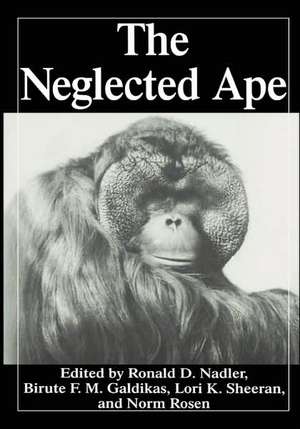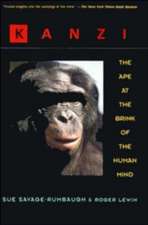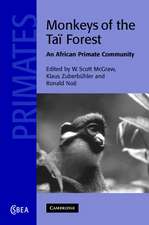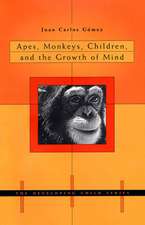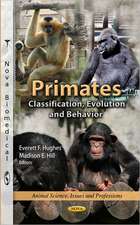The Neglected Ape
Editat de Biruté M.F. Galdikas, R.D. Nadler, N. Rosen, Lori K. Sheeranen Limba Engleză Hardback – 28 feb 1996
| Toate formatele și edițiile | Preț | Express |
|---|---|---|
| Paperback (1) | 949.10 lei 6-8 săpt. | |
| Springer Us – 18 iun 2013 | 949.10 lei 6-8 săpt. | |
| Hardback (1) | 956.69 lei 6-8 săpt. | |
| Springer Us – 28 feb 1996 | 956.69 lei 6-8 săpt. |
Preț: 956.69 lei
Preț vechi: 1166.69 lei
-18% Nou
Puncte Express: 1435
Preț estimativ în valută:
183.08€ • 187.50$ • 152.30£
183.08€ • 187.50$ • 152.30£
Carte tipărită la comandă
Livrare economică 18 martie-01 aprilie
Preluare comenzi: 021 569.72.76
Specificații
ISBN-13: 9780306452130
ISBN-10: 0306452138
Pagini: 300
Ilustrații: XII, 300 p.
Dimensiuni: 178 x 254 x 19 mm
Greutate: 0.77 kg
Ediția:1995
Editura: Springer Us
Colecția Springer
Locul publicării:New York, NY, United States
ISBN-10: 0306452138
Pagini: 300
Ilustrații: XII, 300 p.
Dimensiuni: 178 x 254 x 19 mm
Greutate: 0.77 kg
Ediția:1995
Editura: Springer Us
Colecția Springer
Locul publicării:New York, NY, United States
Public țintă
ResearchDescriere
The orangutan is the most highly endangered species of great ape. Orangutans are threatened by deforestation, poaching, the illegal pet trade, and the isolation and fragmen tation of dwindling wild populations. Their conservation is impeded by certain aspects of their ecology (e. g. , a rain forest habitat) and certain features of their life history (e. g. , an eight-to twelve-year interbirth interval). Added to the U. S. Endangered Species List in 1970, the orangutan is now clearly on the road to extinction. The number of wild orangutans in Borneo and Sumatra is currently estimated to have decreased to between 12,300 and 20,571 individuals. Only 2% of original orangutan habitat is protected and some of these areas are now being destroyed. Clearly, attention to ecology, demography, censusing, rehabilitation, and conservation is essential if the orangutan is to survive in the wild beyond the next century. The protection of orangutans is a complex, multifaceted problem, involving such pressing issues as human poverty, overpopulation, and the economic development of Southeast Asia. Although the orangutan has been placed in Appendix I of the Convention on International Trade in Endangered Species of Wild Fauna and Flora (CITES), more orangutans were sold illegally in Taiwan between 1990 and 1993 than are housed in all the world's zoos. In the past, scientific and public attention has centered on the African apes. For this reason, the sole Asian great ape, the orangutan, has been called the "neglected ape.
Cuprins
Orangutan: Man of the Forest: Of Human Fear and Indifference: The Plight of the Orangutan (G. Kaplan, L. Rogers). The Neglected Ape? (H.D. Rijksen). Orangutan, Science and Collective Reality (A.L. Rose). The Impact of Socioeconomic Decisions on the Status of the Orangutan and Other East Asian Fauna (A.A. Eudey). Conservation, Translocation and Rehabilitation: Conservation of Orangutans: Threats and Prospects (J. Sugardjito). Capture of Wild Orangutans by Drug Immobilization (L.K. Hiong et al.). Rehabilitation Centers: Their Struggle, Their Future (I. LardeuxGilloux). A New Approach to Orangutan Rehabilitation in Indonesia: Some First Results (W.T.M. Smits et al.). Demography: Introduction to the Orangutan PHVA Workshop (K. Soemarna et al.). Using GIS to Evaluate Habitat Risk to Wild Populations of Sumatran Orangutans (T. Faust et al.). Orangutan Life History and VORTEX Analysis (M. Leighton et al.). Estimates of Orangutan Distribution and Status in Sumatra (van Schaik et al.). Estimates of Orangutan Distribution and Status in Borneo (H.D. Rijksen et al.). Conservation Action Plan for Wild Orangutans in Indonesia (K. Soemarna et al.). Population Estimates and Habitat Preferences of Orangutans Based on Line Transects of Nests (C.P. van Shaik et al.). Social and Cognitive Behavior: The Orangutan: A Social Outsider? A Socioecological Test Case (J.A.R.A.M. Van Hooff). Behavioral Changes in Wild Male and Female Sumatran Orangutans during and following Resident Male Takeover (S.S. Utam, T.M. Setia). Imitation and Tool Use in Rehabilitant Orangutans (A.E. Russon, B.M.F. Galdikas). Attentiveness in Orangutans within the Sign Learning Context (G.Shapiro, B.M.F. Galdikas). Sociality of Adolescent Female Orangutans in the Wild (B.M.F. Galdikas). Basic Science and Captive Maintenance: Follicle Stimulation and Ovum Collection in the Orangutan (C.S. Asa et al.). Sexual Behavior of Orangutans: Basic Science and Applied Implications (R.D. Nadler). Proximity, Contact, and Play Interactions of Zooliving Juvenile and Adult Orangutans with Focus on the Adult Male (E.L. Zucker, S.C. Thibaut). A Brief Review of Studies of Orangutan Morphology and Development with a Discussion of Their Relevancy to Physical Anthropology (L.A. Winkler). Genetic Variability in Organgutans (C.C. Muir et al.). Index.
